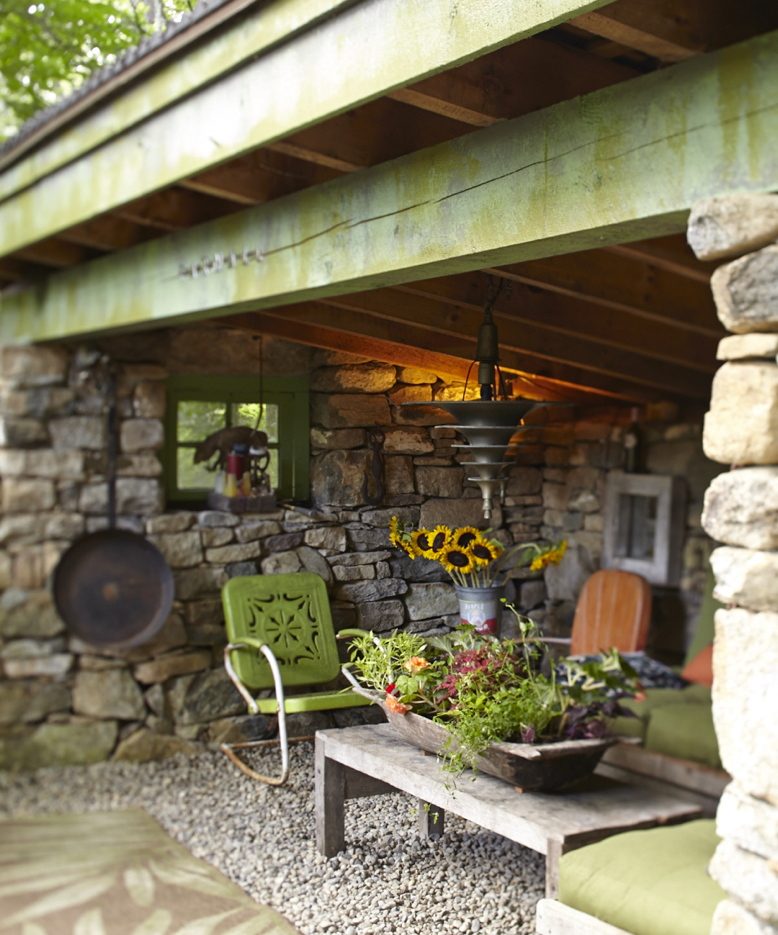
Nick Devlin admits he’s a bit of a throwback. He and his wife, Libby, appreciate a simpler approach to life, a life that fully embraces the outdoors. To achieve the lifestyle they desired, the couple created a backyard wonderland to enjoy with family and friends. Today, their magic garden sprawls across 1.3 acres in the tiny hamlet of Mountainville in rural Tewksbury. “It’s like going back in time here,” says Nick.
When the Devlins bought the property in 1989, they were escaping the clamor and chaos of New York City. Nick wanted a rural setting, while Libby wanted a neighborhood feel. “I was quite happy with a house in the middle of nowhere,” says Nick. They stumbled upon this 1854 farmhouse and figured it would satisfy both their wishes.
The family outgrew the compact 1,800-square-foot house around the time the second of their three now-grown daughters was born. “We were busting at the seams,” Libby says. So the Devlins doubled the home’s size, giving it a Greek Revival façade based on a design Nick drew in crayon at a restaurant. “It was simple but accurate,” he says of the sketch that became a reality.
The house is indeed charming, but it’s the surrounding grounds where the couple really went all out. Fortunately, creativity runs in Nick’s genes. He inherited his artistic bent from his father, the renowned architectural historian and illustrator Harry Devlin, and from his mother, Wende, an accomplished artist, poet and the author of 27 children’s books.
Nick worked as a muralist and decorative artist for most of his career. Now semi-retired, he creates primitive fish sculptures and other works on commission. His studio is the big red barn, one of several original buildings on the property. There are five others: a toolshed, a smokehouse, a sugar shack, a distillery and a two-seater outhouse; only the outhouse still functions in its original capacity (although the main house is equipped with 3-½ bathrooms).
The couple repositioned four of the small buildings so that they sit opposite one another, forming a square. Then gradually, they anointed each with a new function: the sugar shack now houses the sap they collect; the smokehouse—once used for smoking hams—provides storage for Nick’s many fly-fishing poles. The fifth building, the distillery—where the original owners brewed moonshine—had been transformed into an all-season outdoor room. It’s affectionately called the Ruin. “We fixed it up and put a fireplace in it,” says Libby. “We spend an awful lot of time out there.”
Nick has his own take on the Ruin. “It’s really a man cave,” he says, “but when Libby wants to make it her woman cave, she’ll get some linens and flower arrangements and the candelabra, and voila!”
The Ruin sits alongside a stream where Nick can indulge in his favorite pastimes. “We make fires and we go fishing in the stream,” he says. “We catch wild brown trout most weekends. We’ll go out there in the sleet and the cold rain. We make an effort to get out there year-round.”
The grounds are a work in progress, much of it trial and error. The Devlins tried a vegetable garden, “but all the tomatoes wilted, and deer tore through the other parts,” Libby says. When it became overwhelming, the couple turned to landscape designer Helen Grundmann. “Helen helped us get organized,” Libby says. “She transformed the vegetable garden into a cutting garden.” These days, the only vegetables the Devlins grow are rhubarb and asparagus. Grundmann also designed the brick walkways for meandering through the various spaces.
Helen may have been the organizer, but it was Nick who came up with many of the surprising features.
Those finials on the garden fence? They’re actual used bowling balls, acquired from a nearby bowling alley. “I painted them with regular paint and screwed them to the fence,” says Nick. “Yes, they’re super heavy, but once you get them there, it’s done.”
The boot planter? Nick found it upside-down in the attic “There’s a theory that an upside-down boot brings good luck,” says Nick, “but we were skeptical.” So Libby brought it down and transformed it into a flowerpot.
Recently, when a giant sycamore fell, Nick cut the pieces and built an 8-foot-tall igloo. “Nick always has a vision of things you’d never expect,” laughs Libby. Adds Nick, “I don’t go to the gym, I just do all this stuff.”
Springtime is especially busy around the Devlin compound. “Nick is always outside, pruning this, cutting that,” says Libby. “All of a sudden I just can’t find him. I need a walkie talkie or something.”
Libby gets busy in the dry summer months watering and weeding. “It’s a labor of love,” she says.
